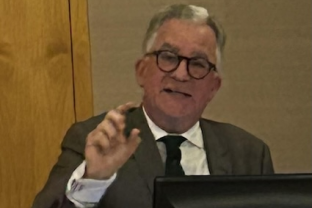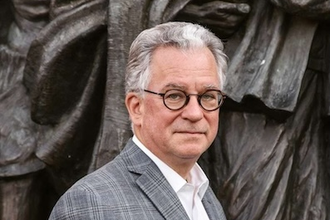Austen Ivereigh reflects on Pope Francis' evangelisation strategy

Dr Austen Ivereigh, papal biographer and Catholic Voices co-founder gave the Landings lecture at Farm Street last Tuesday, reflecting on Pope Francis' strategy for evangelisation. A summary of the lecture: 'Close and concrete: Pope Francis on how to evangelise in a world in flux' follows.
Pope Francis' evangelisation strategy is born from the analysis of the modern world made by the Latin-American Church at its historic 2007 gathering in Aparecida, Brazil, when it called for a "pastoral and missionary conversion" in response to what it called a "change of era". At the heart of the document is understanding the current moment as a time of flux, in which technology-driven changes (liquidity, globalisation) are eroding structures and institutions. Aparecida - whose main author was Cardinal Jorge Mario Bergoglio, now Pope Francis - called for a change in attitude and mindset on the part of the Church, which he summarises in two words: Vicinanza (closeness) and concretezza (concreteness).
"The Church is called to a deep and profound rethinking of its mission," said Aparecida. "What is required is confirming, renewing, and revitalising the newness of the Gospel rooted in our history, out of a personal and community encounter with Jesus Christ that raises up disciples and missionaries." In the future, it noted, "a Catholic faith reduced to mere baggage, to a collection of rules and prohibitions, to fragmented devotional practices, to selective and partial adherence to the truths of the faith, to occasional participation in some sacraments, to the repetition of doctrinal principles, to bland or nervous moralising, that does not convert the life of the baptised would not withstand the trials of time."
1. Technocracy
Francis spells out this "liquidity" in quite dramatic, even apocalyptic terms. He told the bishops in Brazil in July 2013: "A relentless process of globalisation, an often uncontrolled process of urbanisation, have promised great things. Many people have been captivated by the potential of globalisation, which of course does contain positive elements. But many also completely overlook its darker side: the loss of a sense of life's meaning, personal dissolution, a loss of the experience of belonging to any "nest", subtle but relentless violence, the inner fragmentation and breakup of families, loneliness and abandonment, divisions, and the inability to love, to forgive, to understand, the inner poison which makes life a hell, the need for affection because of feelings of inadequacy and unhappiness, the failed attempt to find an answer in drugs, alcohol, and sex, which only become further prisons."
He has spoken in the same vein recently about the future of Europe, about ideological colonisation, in general about the loss of culture. In Santiago de Chile recently he warned: "Without the 'us' of a people, of a family and of a nation, but also the 'us' of the future, of our children and of tomorrow, without the 'us' of a city that transcends 'me' and is richer than individual interests, life will be no only increasingly fragmented, but also more conflictual and violent."
He has highlighted the ambiguity of globalisation: on the one hand drawing people closer, on the other, driving them apart. Laudato Si has many quotes from Romano Guardini's 1950 work The End of the Modern World, especially in relation to the technocratic paradigm, Guardini's concept of what happens when technology shapes our minds and hearts.
Laudato Si' confronts, head-on, this contemporary form of atheism in which men and women are reduced to means rather than ends, mere cogs in a machine and dispensable; hence the throwaway culture. Laudato Si' counterposes the false consciousness that follows the rupture of man and nature (technocratic paradigm) and the new consciousness that will be needed to restore gift and reciprocity (integral ecology).
2. Anguish
Migration as deracination (desocialization) - uprooting: (1) spatially (harder to relate to physical spaces, as well as communities); (2) existentially, in the sense of having future projects, identity; (3) spiritually, in the sense of loss of transcendence - symbols connecting present with eternal. Response to this experience of loss, of uprootedness, is another experience, not an idea: the experience of perceiving the anguish of the other, and responding to needs - spiritual as well as physical, psychological (hard to distinguish). Heart of Gospel is to create an environment of welcome that incarnates God's welcome, one that dignifies human beings.
There is a lot of fear, especially of failure. Plunging self-esteem, rise in depression, suicide, anxiety. Lack of strong families produces stress, lack of resilience. Increasingly shaped by, and trapped by, technology, hence addiction, distraction (distracted mind = unhappy mind). The effect of the technocratic paradigm on the psyche: avoidance, rigidity, rule-following. Health is learning to live with weeds and not to be controlled by them, rather than trying to uproot them. Technocratic paradigm seeks to uproot; seeks perfection, and when this can't be attained, there is a shutdown.
Francis sees people wanting to see Jesus, to experience an encounter with God. Impatient with sentimental, or vague spiritualities; they are TIRED OF WORDS - world is saturated with words - and in need of authentic experience. Bergoglio in 2001 called this una pastoral de encuentro - a pastoral outreach based on encounter.
What do people hunger for? (1) To reconnect with creation as creatures of God, and to experience His love and mercy. (2) To experience family: bonds of trust and unconditional love that will build resilience, character, self-esteem etc. (3) To find sanctuary: place of privacy and prayer outside technocratic paradigm. To learn contemplation.
There is a search for proximity and experience. The Church is called to be close and concrete in response to the cold abstraction and instrumentalism of the technocratic paradigm.
3. Pastoral Conversion
Benedict XVI spotted the problem in 2005 when he wrote: "Being Christian is not the result of an ethical choice or a lofty idea, but the encounter with an event, a person, which gives life a new horizon and a decisive direction." This is repeated in Aparecida, and in Evangelii Gaudium Francis says he "never tires of repeating it".
The crisis of evangelisation in the western Church was partly the result of the Church responding to the threat of relativism / secularism / individualism with an ethical response focussed on the errors of modernity and the truth of what the Church had to offer. But that religion seem like an idea, rather than "the encounter with an event, a person" - an experience. The institution had become distant. The Church was no longer evangelising but talking to itself, focussed on preserving itself.
Francis nailed the issue in February 2015 in addressing the new cardinals. "There are two ways of thinking and of having faith: we can fear to lose the saved and we can want to save the lost. Even today it can happen that we stand at the crossroads of these two ways of thinking. The thinking of the doctors of the law, which would remove the danger by casting out the diseased person, and the thinking of God, who in his mercy embraces and accepts by reinstating him and turning evil into good, condemnation into salvation and exclusion into proclamation."
The Church's institutional failure - that is, its failure to evangelise, to convince, to create culture - is also its path to pastoral conversion, as Pope showed in his address to clergy in Chile. "A Church with wounds can understand the wounds of today's world and make them her own, suffering with them", he said. But this requires putting Christ at the centre, and receiving His mercy, as St Peter did after the Crucifixion. (Transition from Peter the failed disciple to Peter on fire as an apostle).
4. Close and Concrete
This is how God saves us. They are two words of the Incarnation. Close and concrete are incarnational words: it's how God is. So emphatic is Francis on this point that you see that this for him is at the heart of the Gospel, the contemporary spiritual battle: between what is incarnate and what is dis-incarnate. This is something Bergoglio had been saying at least since 1997, when as an auxiliary bishop he had spoken at the synod on the Americas about the "disenchantment" of the contemporary world. Faced with a lack of hope, he said, "the Lord is moved, comes down, and gets close … We must rediscover His way of coming near in order to evangelise. The key word is 'proximity'. Encounter, conversion, communion and solidarity are the categories that express the proximity … that opens the way to hope.
To the Polish bishops in July 2016 he said: "What would I advise? I would say - but I believe it is in the Gospel, where there is precisely the Lord's own teaching - closeness. Today we, the Lord's servants - bishops, priests, consecrated persons and committed laypeople - need to be close to God's people. Without closeness, there are only disembodied words. Let us think - I like to reflect on this - of the two pillars of the Gospel. What are the two pillars of the Gospel? The Beatitudes and Matthew 25, the "criteria" on which all of us will be judged. Concreteness, closeness, touching, the corporal and spiritual works of mercy. But you are saying all this because it is fashionable to speak about mercy this year!" No! This is the Gospel! The Gospel, the works of mercy."
Evangelii Gaudium is all about how the Church can become close and concrete, drawing alongside contemporary humanity as a pastor, servant, healer, enabling an encounter with the living God of mercy as experience, not as an idea. And how this involves a refocussing out onto the peripheries. And a very strong rejection of the temptations or distractions that prevent that: neo-Pelagianism, Gnosticism, an obsession with certain ethical issues, the mentality of it's always been done this way, etc. etc.
The Church evangelises through closeness and concreteness: being close to people in their concrete realities. Without closeness, the Church's moral and ethical proclamation will seem distant and unattainable. He told the Bishops of Brazil: "Today, we need a Church capable of walking at people's side, of doing more than simply listening to them; a Church which accompanies them on their journey; a Church able to make sense of the "night" contained in the flight of so many of our brothers and sisters from Jerusalem; a Church which realises that the reasons why people leave also contain reasons why they can eventually return. But we need to know how to interpret, with courage, the larger picture."
The whole Jubilee of Mercy was an attempt to bring about this pastoral conversion: a God who is close and concrete, not distant and abstract. How can the Church better walk with people who have experienced marriage breakdown? Where is God's grace active in their lives? The three great words of Amoris Laetitia - ACCOMPANIMENT, INTEGRATION AND DISCERNMENT - are "close and concrete" words. They are designed to point to the actions that the Church is called to carry out in the world.
5. Reconciliation / return
The work of the Church on the earth is essentially God's work of creating and reconciling. Evangelisation involves both; being close and concrete involves both. Work of Landings is a great work of evangelisation through reconciliation. As Francis said to the bishops in Brazil, "a Church which realises that the reasons why people leave also contain reasons why they can eventually return."
This requires a joint discernment in which we are all converted. Task of accompaniment, integration and discernment involves the pastoral conversion of the Church. For this, lay people are fundamental as "missionary disciples" (hence Francis's horror of clericalism, which prevents this).
The call to Landings is to create ecology in response to technocracy, not as an idea, but as a praxis. To rebuild community, the bonds of belonging in parish, family and the environment in general, at the heart of which is the experience of the mercy of Jesus Christ.
That is Francis's vision, drawn from Aparecida, of how you evangelise a world in flux.
Based at Farm Street, Mayfair, Landings is a series of relaxed, informal, lay-led meetings, based on faith-sharing within a small group, that offer a safe and supported "landing place" for Catholics who have been away from the Church and are thinking about coming back.
For more information see: https://landings.org.uk/about/


















